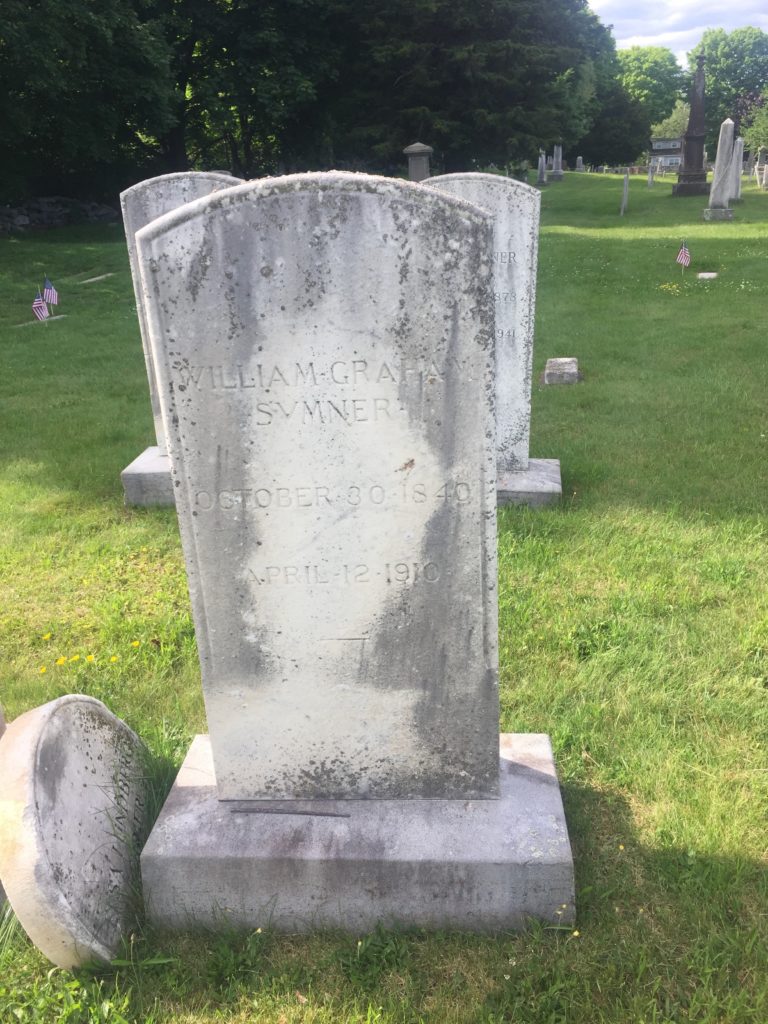Erik Visits an American Grave, Part 704
This is the grave of William Graham Sumner.

Born in 1840 in Paterson, New Jersey, Sumner grew up mostly in Hartford. He went to the public schools there and then onto Yale, graduating in 1863. His father had grown wealthy over the years. Sumner avoided the Civil War by paying some poor sap to fight for him and then took off for Europe, where he traveled around and attended the University of Geneva for a year and the University of Göttingen for two years. From there, it was off to Oxford.
While at that august university, Sumner came to know the social Darwinism of Herbert Spencer and began to adopt it for his own purposes. Spencer’s gross misunderstanding of Darwinism, repurposing the ideas to justify colonialism and white supremacy, was part and parcel of the hardening racism of the second half of the nineteenth century. No one did more to promote this in the United States than Sumner.
Of course, this would take awhile. He came back to the U.S. in 1867, teaching Greek at Yale. He became an Episcopal minister for a few years in New Haven, but left that in 1872 to become a professor at Yale, teaching political science and the social sciences more broadly. There, he got into trouble for teaching Spencer’s Study of Sociology, which angered Yale’s president and led to a big early battle over academic freedom in America. Sumner won that battle. In 1881, he wrote his infamous essay “Sociology,” which argued for the merging of biology and sociology and claimed human behavior could be studied as natural history. Survival of the fittest applied to humans as well and since that could not be fought, it should be embraced. Of course, what this led to in reality was a justification for white domination over the planet. In fact, Sumner was the first person in the United States to teach a course identified as “sociology.” Not so sure that modern sociologists really want to claim that heritage. He was also the second president of the American Sociological Association, in 1908.
Sumner pushed these ideas farther in his essays in the 1880s on warfare, in which he articulated the idea that “primitive” societies didn’t have real war, which came from higher civilization and which was basically the spice of life for “advanced” societies once they had conquered the needs from nature. In truth, Sumner was not a full disciple of Spencer, believing more in the natural progression of society as an inevitability rather than a full constant battle between people and between other species.
Interestingly enough, Sumner opposed American involvement in the Spanish-American War. But this was based on his ideas of classical liberalism, in which he was a standard Gilded Age thinker. He felt that colonialism is what had brought down the Spanish–bringing those dark peoples into the empire and all–and that it created a corrupt plutocracy that undermined the vigor of a democratic nation. This placed him in the company of people such as Andrew Carnegie as free market liberals who hated both socialism and colonialism. Sumner was a bog standard arch-conservative of the time, loathing any social reforms and Edward Bellamy in particular. He wrote many unreadable books on the gold standard (he really was in love with it), banking and the American Revolution, and biographies of Alexander Hamilton and Robert Morris.
Sumner briefly was involved in politics. He served as an alderman in New Haven from 1872-75. But he was so disgusted by what he saw in Louisiana when he went there to investigate fraud in the infamous 1876 presidential election that he eschewed politics for the rest of his life. However, he did testify before Congress in favor of his free market economic ideology on a few occasions. He also served on the Connecticut State Board of Education from 1882 until his death, though he evidently did not consider this a political position. He also supported women’s rights, including greater rights for prostitutes, which put him at odds with the staid sexual norms of respectable Victorians.
Sumner suffered a stroke in 1907, retired from Yale in 1909, and died the next year. He was 69 years old.
Of course, Sumner is beloved by right-libertarians today, such as the hacks in the Mises Institute and the odious Amity Shlaes.
William Graham Sumner is buried in Alderbrook Cemetery, Guilford, Connecticut.
If you would like this series to visit other early presidents of the American Sociological Association, you can donate to cover the required expenses here. Lester Frank Ward is in Watertown, New York and Franklin Giddings is in Great Barrington, Massachusetts. Previous posts in this series are archived here.


